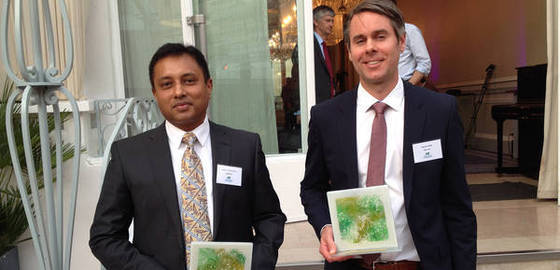Professors Shirish Srivastava and Stefan Worm: Awarded Syntec Prize 2015 for their research
Professors Shirish Srivastava and Stefan Worm were awarded Syntec Prize 2015 for their research in Operations Management and Information Technology, and Marketing. For its seventh edition, the SYNTEC prize for Management Research which aims to reward the best research publications has been awarded to Shirish C. Srivastava, Professor of Operations Management and Information Systems and Stefan Worm, Professor of Marketing.

Each year, organized by Syntec Management and chaired by André-Benoit de Jaegere, Vice-President of Capgemini Consulting, this event gathers consultants and researchers showcasing the best of research in French business schools and universities and the rich collaboration between practitioners and researchers.
In the Operations Management, Control/Information Systems & Technology category, Shirish C. Srivastava was awarded for his article "Bridging The Service Divide Through Digitally Enabled Service Innovations: Evidence From Indian Healthcare Service Providers" published in the MIS Quarterly .
The digital divide is usually conceptualized through the “goods-dominant logic,” where bridging the divide entails providing digital goods to the disadvantaged segments of the population. This is expected to enhance their digital capabilities and thus to have a positive influence on the digital outcomes (or services) experienced. In contrast, Srivastava and his co-author anchor this study in an alternative “service-dominant logic” and posit that viewing the divide from a service perspective might be better suited to the context of developing countries, where there is a huge divide across societal segments in accessing basic services such as health care and education. This research views the prevailing differences in the level of services consumed by different population segments (service divide) as the key issue to be addressed by innovative digital tools in developing countries. The study posits that information and communication technologies (ICTs) can be leveraged to bridge the service divide to enhance the capabilities of service-disadvantaged segments of the society. But bridging the service divide entails significant challenges which they theorize for and examine in this research illustrated through two interesting cases of tele-healthcare implementations in rural India.
In the marketing and decision science category, Stefan Worm won with "Impact of component supplier branding on profitability" published in the International Journal of Research in Marketing .
In recent years, many business-to-business (B2B) component supplier (CS) firms have added branding to their marketing toolbox. By extending the logic of ingredient branding to B2B components, they aim to create “pull” from B2B end customers by building a strong CS brand image among their customers' customers. In contrast with the established “push” approach of building strong relationships with original equipment manufacturers (OEMs), it is unclear whether and under which conditions CS branding is a worthy strategy. On the one hand, anecdotal evidence suggests that suppliers can leverage strong CS brand image in negotiations with increasingly powerful OEMs to enhance their financial performance. On the other hand, many B2B managers believe that branding does not work in their industry context and erodes profitability. Worm and his co-author build a data set consisting of survey measures and archival data across a broad set of industries. Their results indicate that the financial outcomes of CS branding largely depend on the characteristics of the CS and OEM industries. Unlike dyadic OEM–CS relationships, which enhance profitability invariably across industry contexts, CS branding is effective only in well-defined situations. CS branding initiatives can enhance return in CS industries with substantial levels of product differentiation and technology intensity. However, unfavorable results may arise in industry contexts in which OEM–end customer relationships or OEM brands are important.
Note also that in the Strategy &Finance/Business Policy/Corporate Governance category, José- Miguel Gaspar (University Paris Dauphine) was rewarded for his article "Fund managers under pressure: Rationale and determinants of secondary buyout" published in Journal of Financial Economics , and co-written with Ulrich Hege, Professor of Finance at HEC Paris and winner of the Syntec Prize in 2014 in the same category.